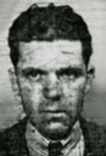 Allen Carter was one of the top engineers for the Indian Motocycle Company during the 1930s and ‘40s. Carter was called on to build experimental models for the company and also personally built many of the factory Indian racers during an era of great on-track success for the Springfield, Massachusetts-based company. Carter also built a unique Indian prototype for the U.S. military during World War II.
Allen Carter was one of the top engineers for the Indian Motocycle Company during the 1930s and ‘40s. Carter was called on to build experimental models for the company and also personally built many of the factory Indian racers during an era of great on-track success for the Springfield, Massachusetts-based company. Carter also built a unique Indian prototype for the U.S. military during World War II.
Carter attained the title of Chief Engineer for Indian and worked for the popular motorcycle manufacturer through 1949. He was considered one of the most knowledgeable engineers in motorcycling during his tenure at Indian and helped produce some of the company’s best street and racing models.
Carter was born in Wilmington, Delaware, in 1906. He came from a family of mechanics and engineers. His great-grandfather was the head mechanic for the Pennsylvania Railroad and his father was a master mechanic for a large shipbuilder in Wilmington. From the time he was around 8 years old, Carter enjoyed all things mechanical.
"I used to build bicycles from junk as a kid," he recalls. "When I was a teenager, I had built motorcycles, boats, cars and even aviation motors, all from scratch."
Carter remembers his boyhood as motorcycling’s golden era.
"Back in the teens, everyone had motorcycles," Carter said. "The dirt roads were so rutted up during the winter and spring that people had motorcycles and rode them on the hard-packed footpaths that ran alongside the roads. People rode motorcycles to work during the week and then on the weekend they would put sidecars on to haul things or take family outings into the country. For a time, motorcycles were much more popular than cars."
Carter had a number of motorcycles as a young man. He owned a large variety of bikes, but he called Hendersons and Indians his favorites.
Carter’s first job out of high school was working at a local gas station and garage. He was an excellent welder and the shop kept him busy welding the fragile cars of the era. He decided working on used cars was too much dirty work.
Fortunately, Carter quickly earned a solid reputation as a mechanic and when he was offered the opportunity to build new cars for the DuPont Motor Car Company, he jumped at the chance. That would prove to be the last job change of his life. He ultimately would work for the DuPont family for 72 years.
Carter rapidly moved from apprentice to one of the leading builders at DuPont. In the 1930s, Carter built DuPont race cars that competed in prestigious races such as the Indianapolis 500 and the 24 Hours of Le Mans.
DuPont ceased automobile production in 1932, due to the Great Depression. E. Paul DuPont had purchased controlling interest in the Indian Motocycle Company over the years, merged the two companies and assumed control at Indian. Carter remained at the old DuPont car manufacturing facility in Wilmington as Indian’s development engineer and began building Indian prototyps. It was Carter’s job to build by hand the new models conceived by the design and engineering team in Springfield. He also was in charge of building the factory racing frames for Indian during the 1930s and early-1940s.
Wooden mock-ups came into the shop and Carter would hammer out the metal over the mold by hand to produce the prototypes.
Carter was often the first to ride the new prototype Indian models. In addition to building the bikes, he put his years of riding to good use by testing the prototypes on the roads around Wilmington.
During World War II, Carter moved to Springfield to supervise the company's war production. Carter built from the ground up the experimental Model 841 shaft-driven Indian produced especially for use in the War. When DuPont sold the company to an investment group headed by Ralph B. Rogers in the mid-1940s, Carter returned to Wilmington and continued working for DuPont. He worked primarily on sport car racing cars in the 1950s and 1960s. Through the 1970s and even into the ’80s, Carter continued working at the old DuPont plant doing contract service repair work on everything from Rolls Royce cars to BMW motorcycles. He also restored classic motorcycles. Carter worked for the DuPont family through the 1990s and didn’t retire until he was 90 years old. Even after his retirement, Carter continued working on small projects at his home shop.
Carter and his wife, who died in the early 1960s, had a daughter. He also has two grandchildren. The Carter tradition carries on with a grandson who is a mechanical engineer graduate. When inducted into the Motorcycle Hall of Fame, Carter, well into his 90s, worked daily at his private shop in a home just a few blocks away from where he was born.
He was inducted into the AMA Motorcycle Hall of Fame in 2001.